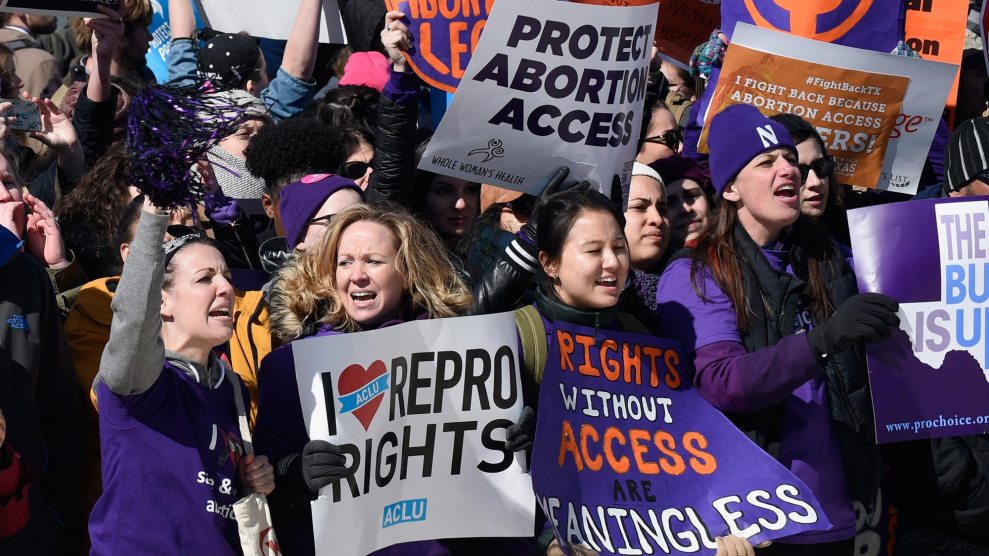
Susan Walsh/AP
A federal appeals court in Washington, DC has allowed the Trump administration to continue to delay access to an abortion appointment for an unaccompanied, pregnant minor being held in a federal refugee shelter.
Friday’s order in the highly-watched case gives the US Department of Health and Human Services until Tuesday evening, October 31 to secure a sponsor to remove the girl from federal custody. Once out of the facility, she could presumably seek an abortion without further interference.
If the government can’t secure a sponsor by the deadline, the circuit court will allow a new round of appeals to be filed on whether the government can continue to obstruct Doe’s access to abortion. In the meantime, the case—which sits at the intersection of immigration law and abortion rights, two top priorities of Trump’s administration—will be sent back to a lower federal court.
Before a packed courtroom on Friday, a three-judge panel of the DC Circuit court heard last-minute arguments in the case of Jane Doe—a 17-year-old currently being housed in a federal refugee shelter in Texas. Doe is about 15 weeks pregnant, and in late September received the judicial authorization required by the state of Texas for minors seeking abortions without their guardian’s consent. But her request for an abortion has been delayed ever since by the Office of Refugee Resettlement (ORR) at the US Department of Health and Human Services, as part of what appears to be a new Trump-era ORR policy to drastically restrict abortion access for unaccompanied minors in US custody.
After Doe obtained judicial authorization as well as private funding for her abortion late last month, she was scheduled to have her state-mandated counseling appointment on September 28, with the procedure to follow the next day. However the ORR-contracted shelter where she is being housed, at the direction of ORR, refused to take her to the appointment. Instead they took her to a counseling session at a religiously-affiliated, anti-abortion crisis pregnancy center where she had a medically unnecessary sonogram.
In a district court hearing on Wednesday, government lawyers argued that its refusal to allow Doe to leave the facility for the abortion did not constitute an unlawful “undue burden” to her right to obtain an abortion because she is free to leave the United States voluntarily to seek an abortion in the home country she has fled. They also asserted that allowing her to leave for the procedure constitutes government “facilitation” of abortion, even though Doe has secured private funding and private transport for the procedure in Texas. The Justice Department lawyers also argued that Supreme Court precedent guarantees only the choice to have an abortion, not the right to then receive one.
The district court issued an order that same day requiring the Trump administration to stop “interfering with or obstructing J.D.’s access to abortion counseling or an abortion,” and mandating that they allow her to be transported to all necessary appointments “without delay.” The Trump administration filed an appeal, and the federal appeals court in DC temporarily halted the order requiring ORR to allow Doe to go to her medical appointments.
In Friday’s hearing, the three-judge panel—which included Bush-appointed judges Brett Kavanaugh and Karen Henderson, and Obama appointee Judge Patricia Millett—expressed their concern at making what Kavanaugh called “a sweeping constitutional ruling in 24 hours.”
The judges repeatedly asked the government to clarify how exactly it would be facilitating this abortion. Catherine Dorsey, the Department of Justice lawyer arguing for the government, responded by saying that an abortion procedure requires the written approval of the director of ORR—in this case, E. Scott Lloyd, a long-time anti-abortion lawyer. Issuing that approval, Dorsey argued, would constitute facilitation, as would any post-abortion healthcare for Doe. (The government is already required to provide healthcare to unaccompanied minors in its custody, Millett pointed out.)
At one point Kavanaugh asked the government to explain how facilitation of abortion differs from enabling abortion access for adult women housed in federal prisons or in immigration custody. Dorsey evaded the question, acknowledging that the government was facilitating abortion in those cases, but noted that this facilitation is not constitutionally required.
The judges also questioned both sides about the possibility of Doe getting a sponsor who would enable her to be discharged from the shelter, which would effectively end the case without requiring the judges to issue a ruling on the constitutional right of abortion for unaccompanied minors.
Brigitte Amiri, the ACLU attorney representing Doe, explained that two relatives had been asked about sponsoring Doe, but without success. Attorneys for both sides also noted that the approval process for a sponsor can take weeks or months—an amount of time that Doe does not have. Abortion is illegal in Texas after 20 weeks, and the clinic near Doe only performs abortion up to 17 weeks and 6 days. If the case is not resolved before 18 weeks, she will have to make two round-trip drives across hundreds of miles to obtain abortion care.
“Every day she remains pregnant takes a toll on her physical and emotional health,” Amiri argued in court on Friday. “The harm to J.D. in this circumstance is irreparable. She is going to be pushed later into her pregnancy—she’s already been pushed from the first trimester into the second trimester. The further that we get, the further the risks that are apparent for her, and also if we get so far, she’ll be forced to carry this pregnancy to term against her will.”
Balancing the harm to Doe with “the government making a phone call is quite easy here,” Amiri said.
Friday’s ruling from the appeals court means at least another week of delays for Doe before she can an abortion, given the deadlines imposed by the order, the schedules of doctors at the closest clinic, and the time needed for any possible appeals.
You can read the federal court’s full order below:













